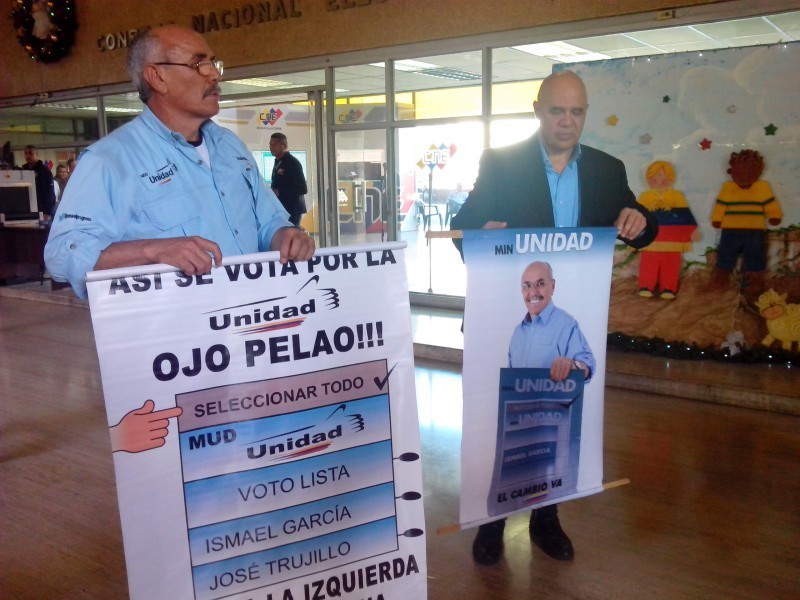Venezuela's Election: The Basics
On Sunday Venezuelans vote in the most momentous elections in recent memory. Here's a primer for people coming fresh to the story of 6D.


What is Venezuela voting on?
People will head to the polls to elect all 167 members of the National Assembly – our single-chamber legislative branch.
When?
This Sunday, December 6th. (That’s why we use “6D” as shorthand for the election.)
Who’s running?
There are two big blocks: the governing party that Hugo Chávez founded, PSUV, and the opposition’s Democratic Unity Roundtable, known by its unfortunate-in-English acronym, MUD.
There are smaller parties and independents, too, but they’re not expected to score any seats.
Who’s winning?
Every halfway credible opinion poll we’ve seen gives the opposition a double-digit lead in the national popular vote, with many pollsters showing us with 15-25 point leads. It’s not close.
However, because of Venezuela’s weirdly complicated electoral system (gory details here) it’s hard to say how many seats in the assembly that will mean. The opposition is almost sure to get a simple majority, but what we really want is a qualified majority of 3/5ths or even 2/3rds of the Assembly. That would give the opposition a much stronger hand in dealing with the Maduro government.
Our in-house forecasting model suggests the opposition could get 111 seats – just one seat shy of the coveted 2/3rd supermajority that allows you to call a binding referendum on pretty much any question. That’s a bit higher than the 90-100 seat consensus out there, but lower than some estimates we’ve seen.
Is a qualified majority even in the cards?
That question right there’s the easiest way to get two Venezuelan politics junkies to argue these days!
We think 3/5ths is definitely possible. 2/3rds looks hard to me, but not insane.
I thought chavismo was popular. How come the government is losing so badly?
Venezuela is going through its worst economic depression ever. Inflation is out of control, you can’t find the basics in the shops – food staples, medicine, diapers, toilet paper – unless you stand in line for several hours. The country is really chaotic, street crime is still out of control and the economy is horrifically – almost comically – badly run. People are really fed up.
Also, nobody likes Nicolás Maduro, the guy Chávez set up as his heir.
Are the elections fair?
They’re not even close to fair. The list of dirty tricks, unfair advantages, abuses of power and other campaign violations the government has engaged in is very long. And that’s not me saying it, it’s the Secretary General of the Organization of American States, along with many others.
Some of the dirty tricks are so brazen you almost admire them. For example, the government took over a tiny party, “MIN-Unidad”, and made sure its graphic design on the ballot was very similar to MUD’s, even though it backs government candidates. They then placed MIN-UNIDAD’s card on the ballot paper right next to the MUD‘s UNIDAD card, all to try to confuse voters into voting for the wrong side.
In one district, they even recruited a guy who happened to have the same name as the opposition’s candidate, Ismael García, to run on MIN-UNIDAD’s card. They then put the photos of the real Ismael García on campaign posters for the fake party…really!

On the left, the real opposition candidate, Ismael García, holding the MUD’s real poster. On the right, a poster by the fake party, MIN-UNIDAD that uses the real Ismael García’s face, telling people to vote for a party that in fact nominated another guy also named Ismael García. That’s some baroque cheating right there!
What’s remarkable is that even though they’ve gone to these crazy extremes to cheat, they’re still likely to lose bigtime.
Couldn’t the government just steal the election on Sunday night?
Not without it being really obvious to absolutely everyone.
Venezuela’s election system has many deep flaws, but it has one major virtue: we vote with electronic machines that leave a paper trail, and a sample of those paper ballots is hand counted at every voting center, nationwide. If the sums announced in Caracas don’t match the paper trail audits in each voting center, it’s very easy to see that. And that’s never happened.
But I heard that the machines were run out of a secret room in Cuba…
There’s a huge amount of mythologizing about our voting machines. In the end, they’re just the world most expensive pencil: they produce printouts, and the printouts are counted by hand. No hacker in Timbuktu or anywhere else can do anything about that.
But aren’t the machines on a wireless network that…
Que no, coño, ya.
So what comes next?
Venezuela hasn’t faced a situation like this, where the government doesn’t quite control the entire state, in almost 17 years now.
If, as expected, the opposition takes control of the legislative branch, we’re heading into terra incognita: turmoil and violence are definite possibilities. But a serious, high stake political negotiation is also a real possibility. Even outright regime collapse can’t really be ruled out. Things are just about to get interesting.
Caracas Chronicles is 100% reader-supported.
We’ve been able to hang on for 22 years in one of the craziest media landscapes in the world. We’ve seen different media outlets in Venezuela (and abroad) closing shop, something we’re looking to avoid at all costs. Your collaboration goes a long way in helping us weather the storm.
Donate




